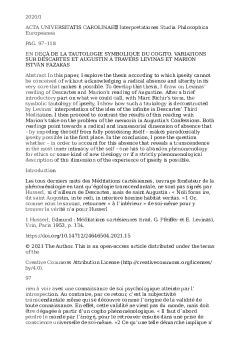I fazakas en dec a du cogito interpret 10 1 0097
ACTA UNIVERSITATIS CAROLINAE Interpretationes Studia Philosophica Europeanea PAG ?? EN DEÇÀ DE LA TAUTOLOGIE SYMBOLIQUE DU COGITO VARIATIONS SUR DESCARTES ET AUGUSTIN À TRAVERS LEVINAS ET MARION ISTVÁN FAZAKAS Abstract In this paper I explore the thesis according to which ipseity cannot be conceived of without acknowledging a radical absence and alterity in its very core that makes it possible To develop this thesis I draw on Levinas ? reading of Descartes and Marion ? s reading of Augustine After a brief introductory part on what we could call with Marc Richir ? s term the symbolic tautology of ipseity I show how such a tautology is deconstructed by Levinas ? interpretation of the idea of the in ?nite in Descartes ? Third Meditation I then proceed to contrast the results of this reading with Marion ? s take on the problem of the memoria in Augustin ? s Confessions Both readings point towards a radical and immemorial dimension of absence that ?? by impeding the self from fully possessing itself ?? makes paradoxically ipseity possible in the ?rst place In the conclusion I pose the question whether ?? in order to account for this absence that reveals a transcendence in the most inner intimacy of the self ?? one has to abandon phenomenology for ethics or some kind of new theology or if a strictly phenomenological description of this dimension of the experience of ipseity is possible Introduction Les tous derniers mots des Méditations cartésiennes ouvrage fondateur de la phénoménologie en tant qu ? ??égologie transcendantale ne sont pas signés par Husserl ni d ? ??ailleurs de Descartes mais de saint Augustin Noli foras ire dit saint Augustin in te redi in interiore homine habitat veritas ? Or comme nous le savons retourner à l ? ??intérieur ? de soi-même pour y trouver la vérité n ? ??a pour Husserl Husserl Edmund Méditations cartésiennes trad G Pfei ?er et E Levinas Vrin Paris p https doi org ? The Author This is an open-access article distributed under the terms of the Creative Commons Attribution License http creativecommons org licenses by rien à voir avec une connaissance de soi psychologique atteinte par l ? ?? introspection Au contraire par ce retour c ? ??est la subjectivité transcendantale même qui se découvre comme l ? ??origine de la validité de toute connaissance En e ?et cette validité ne vient pas du monde mais doit être dégagée à partir d ? ??un cogito phénoménologique Il faut d ? ??abord perdre le monde par l ? ?? ? ? ? pour le retrouver ensuite dans une prise de conscience universelle de soi-même ? Ce qu ? ??une telle démarche implique n ? ?? est rien de moins que l ? ??espoir que le sujet transcendantal puisse se posséder lui-même et être le principe de sa propre validité la validité de son déploiement ou fonctionnement transcendantal et de la validité de ses e ?ectuations Par cette possession du soi-même on peut également regagner ce
Documents similaires










-
50
-
0
-
0
Licence et utilisation
Gratuit pour un usage personnel Aucune attribution requise- Détails
- Publié le Mai 06, 2022
- Catégorie Philosophy / Philo...
- Langue French
- Taille du fichier 110.4kB


